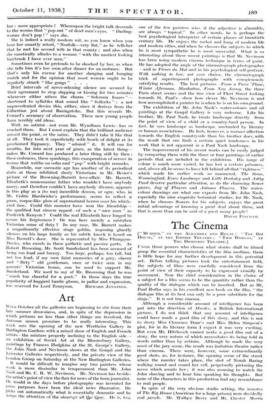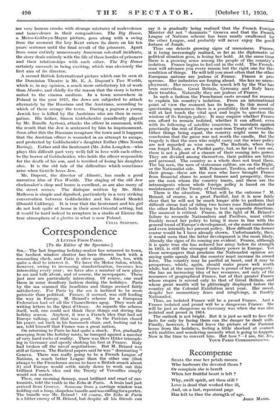The Cinema
I" Mvanita," AT THE ALHAMBRA AND REGAL ; "THE BM HOUSE," AT THE EMPIRE THEATRE; "TWO WORLGS," AT TIIE DOMINION MI.:ATM.:1 UNTO. those powers who choose what stories shall be filmed grasp the essential characteristics of the film medium, there is little hope for any further development in this potential art. Before talking pictures took the entertainment field, the subjects of films were carefully considered from the point of view of their capacity to be expressed visually by movement. Now the chief consideration in the choice of a subject for a film seems to be the quantity rather than the quality of the dialogue which can be inserted. But as Mr, Paul Botha says in his excellent new book on the film, "the dialogue film at its best can only be a poor substitute for the stage." It is not true cinema.
Although a considerable amount of intelligence has been put into the direction of Murder, a British International picture, I do not think that any amount of intelligence could have made a good film of this story, and this is not to decry Miss (lenience Dane's and Miss Helen Simpson's plot, for in its literary form I expect it was very exciting. But even Mr. Hitchcock cannot make a good film out of a story, the very nature of which necessitates its being told in words rather than by actions. Although he made the very most of the jury scene, the result was imitation theatre ratlwr than cinema. There were, however, sonic extraordinarily good shots, as, for instance, the opening scene of the street where the murder takes place, the shot of Norah Baring walking round and round her cell, perpetually picturing the noose which awaits her ; it was also amusing to watch Sir John shaving and to hear him speaking his thoughts. But none of the characters in this production had any resemblance to real people.
In spite of the very obvious studio setting, the inmates of The Big House (American for a large prison) were decidedly real .twoole. Mr. _Wallace Beery. and Mr. Chester Morris are very human crooks with strange mixtures of malevolence and benevolence in their compositions. The Big Rouse, a Metro-Goldwyn-Mayer picture, goes along with a swing from the moment the boy Kent enters its doors on his ten years' sentence until the final revolt of the prisoners. Apart from some entirely unnecessary American sob-stuff incidents, the story deals entirely with the life of these hordes of prisoners and their relationships with each other. The Big House certainly succeeds in being exciting, which was obviously the first aim of its director.
A second British International picture which can be seen at the Dominion Theatre is Mr. E. A. Dupont's Two Worlds, which is, in my opinion, a much more satisfactory bit of work than Murder, and chiefly for the reason that the story is better suited to the cinema medium. In a town somewhere in Poland in the year 1917, the Jews are subjected to attack alternately by the Russians and the Austrians, according to which of them occupy the town. During a pogrom a young Jewish boy is killed by the Austrians who are then in occu- pation. His father, Simon Goldscheider (excellently played by Mr. Brindle Ayrton), attacks the officer in command, with the result that the Jew is sentenced by him to imprisonment. Soon after this the Russians recapture the town and it happens that the Austrian officer is wounded in an attempt to escape, and protected by Goldscheider's daughter Esther (Miss Norah Baring). Esther and the lieutenant (Mr. John Longden—who plays this difficult part very well) fall in love with each other, to the horror of Goldscheider, who holds the officer responsible for the death of his son, and is terrified of losing his daughter also. It is the old tale of the difficulties which sometimes arise when Gentile loves Jew.
Mr. Dupont, the director of Atlantic, has made a good narrative film of Two Worlds. The staging of the old Jew clockmaker's shop and house is excellent, as are also many of the street scenes. The dialogue written by Mr. Miles Malleson is simple and dignified, particularly in a very striking conversation between Goldseheider and his friend Mendel (Donald Calthrop). It is true that the lieutenant and his girl do not look quite at home in their semi-Oriental setting, but it would be hard indeed to recapture in a studio at Elstree the true atmosphere of a ghetto in what is now Poland.
CELIA SIMPSON.









































 Previous page
Previous page